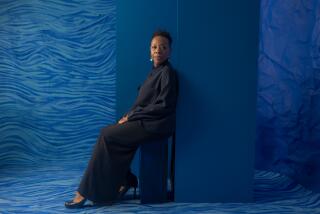THE CHRONICLES OF JAMIE LEE CURTIS
- Share via
Jamie Lee Curtis is holding court in a suite at the Four Seasons hotel in West Los Angeles to chat about “The Heidi Chronicles.”
The spunky 36-year-old actress is in great spirits, cracking jokes and egging the TNT publicist to cut her hair as short as Curtis’ new ‘do. But when the daughter of Tony Curtis and Janet Leigh sits down to begin the interview, she becomes a great deal more serious.
See, she’s decided to make some big changes in her life and career. Making “The Heidi Chronicles” helped her decide to put the interests of her 9-year-old daughter Annie ahead of her own.
Curtis portrays the central character in the play, art historian Heidi Holland. “Chronicles” follows Heidi through 30 years of life--from an idealistic teen-ager in 1965 to the single mother of an adopted daughter in 1995. Curtis acknowledges she didn’t go through the struggles Heidi and her generation did.
Making the movie “humbled you to realize the struggles that went on before you. I mean, it’s very hard to remind a generation of women today about who started this for them and who led the way. It did make me stop and consider that there were women who struggled to allow me on some level to demand equal pay for equal work in many areas. The people who are doing the struggle often say they are doing it for the next generation, and the next generation very rarely recognizes the struggle.”
The actress, who is married to actor/director Christopher Guest, believes that there is currently a backlash to the women’s movement. “I think there’s a fallout to all of this,” Curtis explains. “I think it’s profound. I think it has to do with children because I think, in fact, we are raising generations of motherless children.”
The first eight years of a child’s life, she says, are very important. “I feel liked I missed [that period],” Curtis says. “I feel like I blew it.”
Though she hasn’t worked constantly, the times she missed with Annie were not “tokens you can recall and say, “I was there for a month.’ Every woman is going to defend their need to work. They are going to defend it on an economic basis. They are going to defend it as, ‘This is what’s going to make me happy and therefore, a happy mommy is more important than a miserable mommy.’ ”
There are compromises, she says, working moms can make. She calls it “a huge gray area,” but “we could all do another kind of work that would be a lot more part-time and would still give us our excitement for our work. ... That’s going to anger a lot of women, but I don’t care because I truly believe that now.”
At the conclusion of “The Heidi Chronicles,” Curtis’ character achieves some sense of inner happiness when she adopts a baby. “For me, the thrill was at the end when Scoop says [to her], ‘You are happy.’ Finally, Heidi has been able to get out of herself to be happy. It takes [the baby] to get her out of herself to find happiness.”
Like Heidi, Curtis says she hasn’t been happy, “because I have still made it about me. I am finally going to make it about her. It’s wonderful. It is just a huge adjustment. I am going to take some time now just to reorder myself and then do less work because, although I still need to work to earn my living, I don’t have to work as much as I did.”
And her work, she adds, “isn’t what really gives me that sense of myself. It did for a long time--it gave me a lot of confidence. But I’m lucky I’ve been able to figure this out.”
Curtis feels her best job was starring in the 1989-92 ABC comedy series “Anything but Love.” She’s in negotiations to return to the world of series comedy.
“In my adjustment, I tried to look back,” she explains. “Features are good--’True Lies’ was great, but it was seven months of my life. I left my family for the first time in my life. It was one of those things when I assuaged my guilt by saying she came over every 11 days and was there for six days. That was a Band-Aid. I still left my family to go do my work.”
A series, she says, allows her to do the “best thing I can do, which is sort of this light comedy.” And, perhaps more importantly now, “I get to go home. We know what my schedule is for a year in advance. I get a week off every three weeks and you get a big chunk of time off after the season is over. It’s an ideal job for an actor.”
More to Read
The complete guide to home viewing
Get Screen Gab for everything about the TV shows and streaming movies everyone’s talking about.
You may occasionally receive promotional content from the Los Angeles Times.







